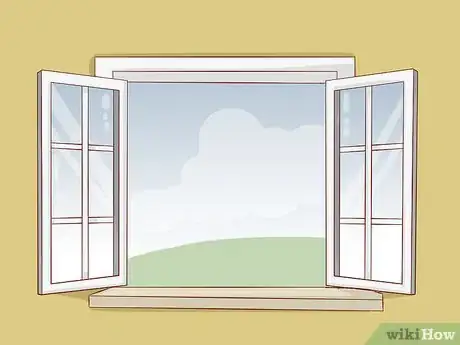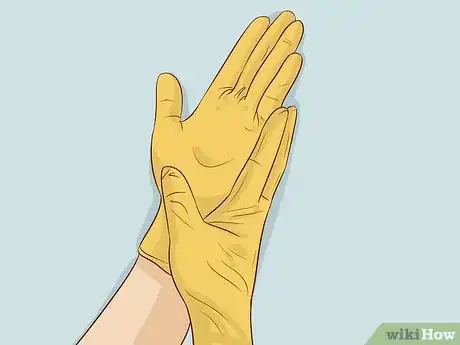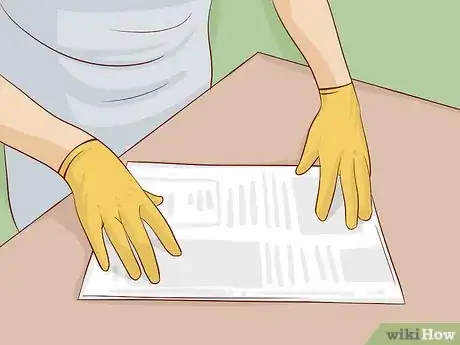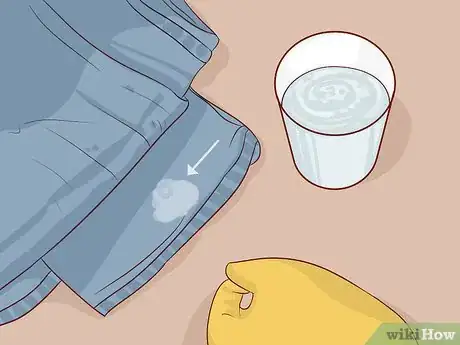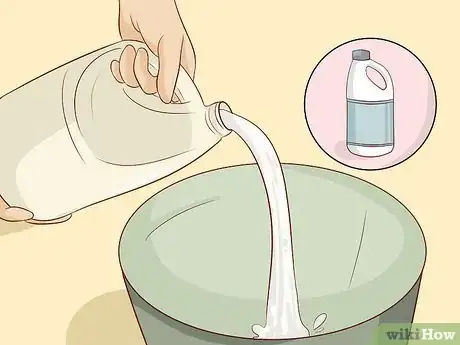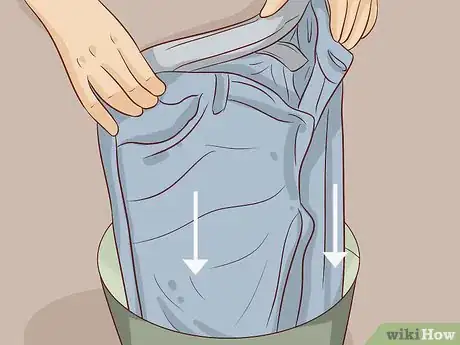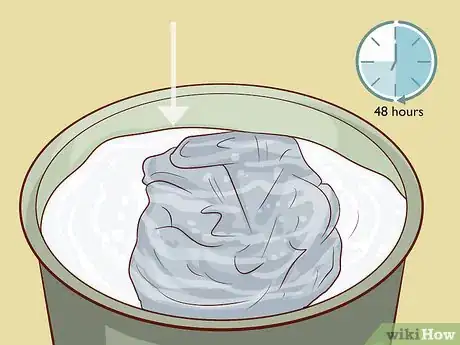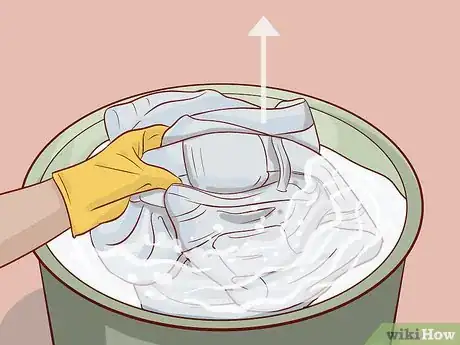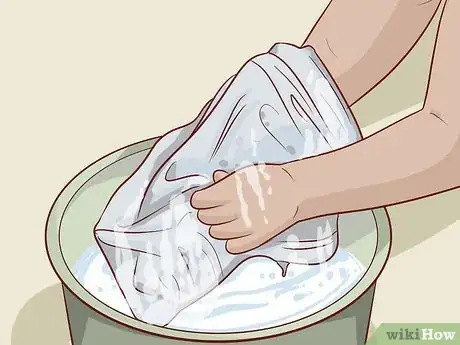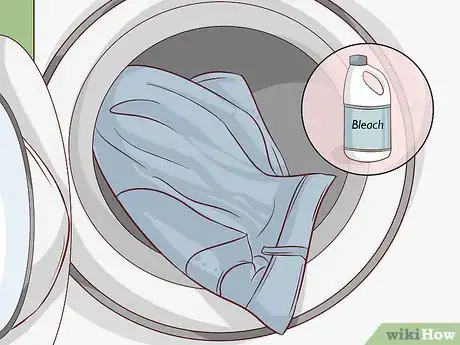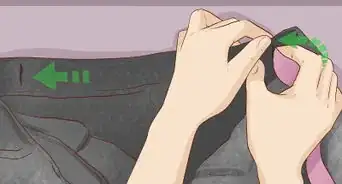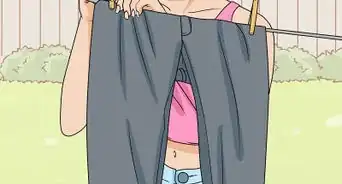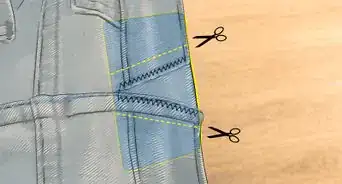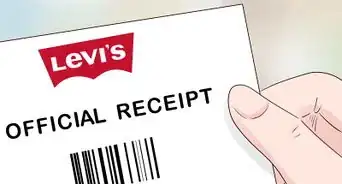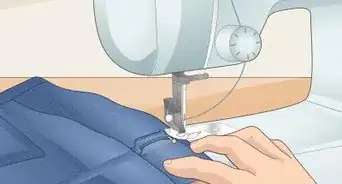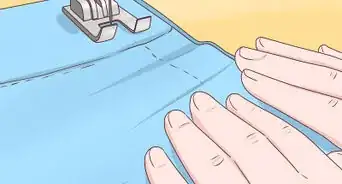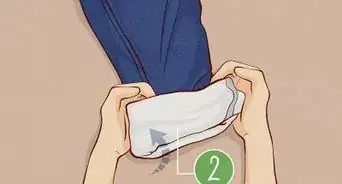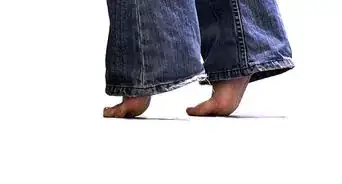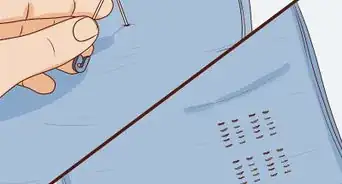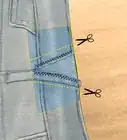This article was co-authored by wikiHow Staff. Our trained team of editors and researchers validate articles for accuracy and comprehensiveness. wikiHow's Content Management Team carefully monitors the work from our editorial staff to ensure that each article is backed by trusted research and meets our high quality standards.
There are 12 references cited in this article, which can be found at the bottom of the page.
This article has been viewed 28,931 times.
Learn more...
With just a container of bleach, a spacious container, and a little patience, you can revive any drab old pair of blue jeans by fading them to a crisp white color that works as a versatile base for any outfit. Just fill your container with a diluted bleach solution, add your jeans, and wait for the chemical to work its magic. In just a few hours, the bleach will have stripped most or all of the dye from the jeans, leaving them an eye-popping shade of white that shines almost as bright as you do.
Steps
Working with Bleach Safely
-
1Set up your materials in a well-ventilated area. Before you get started, crack a nearby window or switch on your air conditioning or an overhead fan to get some air moving through your work space. Chlorine bleach gives off strong fumes that could be harmful to breathe, so it’s a good idea to create as much airflow as possible.[1]
- If you have no way of ventilating your work area, make it a point to spend as little time in the room as possible throughout the bleaching process.
-
2Pull on a pair of rubber gloves to protect your hands. A pair of elbow-length dishwashing gloves is ideal for this type of project. If you don’t happen to have any of these on hand, ordinary latex or nitrile gloves will also work. Double-check that the gloves are in good condition, with no noticeable tears or holes where bleach could get in.[2]
- Longer gloves will leave less of your skin exposed to the bleach.
Warning: Chlorine bleach can cause mild-to-moderate chemical burns when it comes into contact with unprotected skin.[3]
Advertisement -
3Put down newspaper or another protective covering in your work area. Place a few folded sheets of newspaper around the base of the container you’ll be using to bleach your jeans. You can also use plastic sheeting, a canvas tarp, or an old bedsheet. The important thing is to provide some kind of buffer in the event of unexpected spills or splashes.[4]
- Carpet, throw rugs, bath mats, curtains, and certain types of flooring could become discolored if they get bleach on them accidentally.
Getting Just the Right Shade
-
1Spot-test your jeans to make sure they’ll come out the color you want. Combine 2 teaspoons (9.9 mL) of concentrated bleach with 1⁄4 cup (59 mL) of cold water in a small measuring cup. Use a dropper tool or spoon to apply about 1 teaspoon (4.9 mL) of the bleach solution to an inconspicuous part of your jeans, such as the inside of a hem or pocket, then wait about 5 minutes. The resulting color will tell you how well your jeans will react to the bleach, and what color they’re likely to turn out.[5]
- Use cold water only. Hot water will neutralize the main chemical agents in the bleach, essentially rendering it ineffective.[6]
- Different garments are dyed using different methods. If your jeans were made with regular type of dye, it should be possible to bleach them to a crisp white. If they were colored with a fiber-reactive type of dye, you’ll probably be able to strip most of the color, but may not be able to get them pure white.
-
2Mix 1⁄4–1⁄2 cup (59–118 mL) of bleach with 1 gallon (3,800 mL) of water. Fill a large container with cold water, then pour in an appropriate amount of concentrated bleach. You can increase the amounts of both components as needed if the solution doesn't fill your container, or if you're bleaching multiple pairs of jeans at once. Just be sure to keep the overall ratio around 1 part bleach for every 32-64 parts water.[7]
- If possible, always do your bleaching in a washing machine or bathtub. If that’s not an option, a deep bucket, wash tub, or solidly-built storage container with steep sides can make a suitable substitute.[8]
- To make the most of the bleach’s color-fading capabilities, you could even use a ratio as high as 1:1—that is, equal parts water and bleach.
- Using too high a concentration of bleach (anything greater than about a 1:1 ratio), which is full of harsh chemicals, could cause your jeans to deteriorate prematurely.
-
3Add your jeans to the bleach solution. Push the jeans down beneath the surface of the solution until they’re completely submerged. Try to position the legs of the garment in a way that minimizes bunching or folding. Otherwise, different sections may accept the bleach unevenly.[9]
- Lower the jeans slowly to avoid splashing.
Tip: If for some reason your jeans want to float on the surface of the solution, try weighing them down with small, heavy objects that won’t be damaged by the bleach.
-
4Soak your jeans for up to 48 hours, or until they turn completely white. Depending on how dark your jeans are, it could take as little as a few hours or as long as 2 full days for them to lose all of their original color. Watch them closely for the first few minutes after you put them in to see how fast the dye seems to be leaving them, then keep an eye on them while they soak to monitor their progress.[10]
- Keep your work area off-limits for the entire duration that it takes to bleach your jeans if you have pets or small children at home.
-
5Reposition your jeans in the bleach solution periodically. Every 20-30 minutes, come back and move the jeans around so that they’re sitting in a different configuration. This will help ensure that all parts of the fabric are exposed to the bleach equally. As a result, they’re less likely to come out streaked, spotted, or showing signs of other color defects.[11]
- It’s okay to go a little longer between adjustments if you think you’ll be bleaching your jeans overnight.
- Use a pair of metal tongs to rearrange the jeans if you don’t want to stick your hands directly into the bleach solution.
Rinsing Your Jeans Clean
-
1Remove your jeans when you’re satisfied with their new color. Carefully lift the jeans out of the bleach solution, allowing the excess liquid to drip off before transferring them to the sink or washing machine for a final rinsing. Drain the used solution from your bleaching container.[12]
- You’ll want to scrub your bleaching container with clean water and a little bit of fresh bleach before reusing it, especially if you used your bathtub or a container that you normally store food or water in.
-
2Rinse your jeans thoroughly with warm water to flush out the remaining bleach. Hold the freshly-bleached jeans under a running faucet or plunge them into a separate water-filled container. As you rinse the garment, squeeze it all over to keep the water moving continuously through the fabric. Alternatively, you can simply run your jeans through the washer on a normal wash cycle prior to wearing them again.[13]
- To dry hand-rinsed jeans, throw them in the dryer like usual or hang them up to air dry.
- Be sure to keep your gloves on until you’ve diluted the lingering bleach to the point where it will no longer irritate your skin.
Tip: If you decide to machine wash your jeans, put them in by themselves or with other white garments. Even a small amount of bleach could ruin the appearance of colored clothing items.
-
3Wash your jeans with bleach regularly to remove even more dye. If your jeans don’t come out quite as white as you hoped, one thing you can do is add about 1 cup (240 mL) of bleach to the washing machine during future washings. That way, you can continue stripping the color little-by-little. Eventually, they should lose the rest of their original dye altogether.[14]
- An added advantage of washing your jeans with bleach is that it lifts out more dirt and stains than detergent alone. This is good news if the pair you’re working with are particularly dingy.[15]
- If you don’t want to wait on your jeans to fade, you also have the option of repeating the entire bleaching process after washing and drying them.
Things You’ll Need
- Gloves
- Newspaper
- Measuring cup
- Concentrated chlorine bleach
- Cold water
- Dropper tool or spoon
- Plastic sheeting, canvas tarp, or old sheet (optional)
- Large bucket, wash tub, or storage container (optional)
- Metal tongs (optional)
References
- ↑ https://www.safetyandhealthmagazine.com/articles/18307-working-safely-with-bleach
- ↑ https://www.whowhatwear.com/how-to-bleach-clothes/slide4
- ↑ https://emergency.cdc.gov/agent/chlorine/basics/facts.asp
- ↑ https://www.knownman.com/how-to-fade-jeans-at-home/
- ↑ https://www.washingtonpost.com/lifestyle/home/bleach-isnt-so-scary--if-you-know-how-to-use-it-correctly/2019/01/07/decb5514-0470-11e9-b5df-5d3874f1ac36_story.html
- ↑ https://www.info.gov.hk/info/sars/en/useofbleach.htm
- ↑ https://www.elle.com/fashion/news/a14939/distress-bleach-patch-jeans-diy/
- ↑ https://www.knownman.com/how-to-fade-jeans-at-home/
- ↑ https://www.youtube.com/watch?v=VZ3oLuZm17o&feature=youtu.be&t=145
- ↑ https://www.youtube.com/watch?v=SZbT4lpAf-A&feature=youtu.be&t=32
- ↑ https://www.youtube.com/watch?v=ROCNotleUs8&feature=youtu.be&t=107
- ↑ https://www.youtube.com/watch?v=SZbT4lpAf-A&feature=youtu.be&t=58
- ↑ https://www.knownman.com/how-to-fade-jeans-at-home/
- ↑ https://www.washingtonpost.com/lifestyle/home/bleach-isnt-so-scary--if-you-know-how-to-use-it-correctly/2019/01/07/decb5514-0470-11e9-b5df-5d3874f1ac36_story.html
- ↑ https://www.ncconsumer.org/news-articles-eg/how-to-get-the-whitest-whites-using-bleach.html
